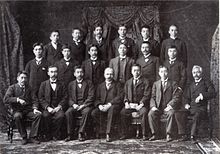Franz Baltzer
Franz Baltzer (* 29. May 1857 in Dresden , † 13. September 1927 in Wiesbaden ) was a German engineer of the railway sector and government official. He was also an advisor to the Japanese government ( o-yatoi gaikokujin ) during the Meiji period .
Life
Baltzer was the son of the Giessen mathematics professor Richard Baltzer . He also passed his Abitur in Giessen. After completing his studies, Baltzer initially worked for the state railway administration authorities in Prussia and was involved in building up the network in Berlin and building the train station in Cologne . He also traveled to Scotland and the United States to improve his knowledge.
In 1886 he became a Prussian government master builder. From 1891 he worked in the Prussian Ministry of Public Works . In 1898, at the request of the Japanese government , Baltzer became an advisor to the Railway Office of the Japanese Ministry of Communications ( Teishin-shō ). As part of his work, he supervised the track construction between Shimbashi , Tokyo and Yokohama (today: Sakuragichō ) - while Baltzer used his activity to push back the influence of British and American imports of rails and construction machinery in favor of German products. In addition, he conducted studies on Japanese architecture during this time , which he incorporated into his activities. His design for the future Tokyo station was rejected as "too Japanese" - instead, the western design by the Japanese Kingo Tatsuno was chosen.
His contract ended on February 28, 1903. Baltzer returned to Germany and briefly became a member of the railway administration in Stettin before joining the colonial department of the Foreign Office at the end of 1906 . After the establishment of the Reich Colonial Office in 1907, he became a lecturer there. At the age of 57, he took part in the First World War as a captain and company leader , where he was wounded on October 30, 1914 in the First Battle of Flanders near Dixmuiden . After the Reich Colonial Office closed in 1919, Baltzer retired. In 1920 he became a full honorary professor at the Technical University of Berlin . In 1923 he was appointed a full member of the Academy of Building . He died in 1927.
Fonts
In addition to writings on Berlin railways, Baltzer also published a number of treatises in the field of colonial railways and construction.
- The electric light rail in Berlin by Siemens & Halske. Springer-Verlag, Berlin 1897.
- The Japanese house: a structural study. In: Zeitschrift für Bauwesen , year 1903.
- The architecture of the cult buildings of Japan. Wilhelm Ernst & Son, Berlin 1907 ( online ).
- The opening up of Africa by railways, lecture by Franz Baltzer. Wilhelm Solf, Berlin 1913.
- The bridge over the Sanaga southern arm as part of the Cameroon Central Plateau . In: Colonial monthly sheets , vol. 15, 1913, pp. 22-26.
- The colonial railways: with a special focus on Africa. Göschen, Berlin 1916 ( online ).
literature
- Franz Baltzer. In: Heinrich Schnee (Ed.): German Colonial Lexicon. Quelle & Meyer, Leipzig 1920, Volume I, p. 123 f. ( online ).
- F .: Franz Baltzer † . In: Zentralblatt der Bauverwaltung , vol. 47, 1927, pp. 545-546 ( digitized version of the Central and State Library Berlin ).
Individual evidence
- ↑ Masami Ito: Tokyo Station at 100: all change. In: The Japan Times Online. December 13, 2014, accessed November 7, 2015 .
| personal data | |
|---|---|
| SURNAME | Baltzer, Franz |
| ALTERNATIVE NAMES | Baltzer, Franz Adolf Wilhelm |
| BRIEF DESCRIPTION | German railroad engineer |
| DATE OF BIRTH | May 29, 1857 |
| PLACE OF BIRTH | Dresden |
| DATE OF DEATH | September 13, 1927 |
| Place of death | Wiesbaden |

